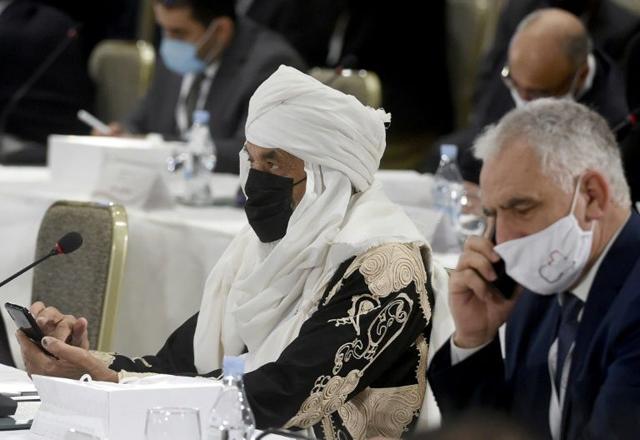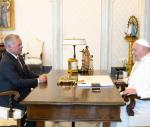You are here
What are the latest Libya talks all about?
By AFP - Nov 11,2020 - Last updated at Nov 11,2020

The UN-led Libyan Political Dialogue Forum aims to appoint an interim government to prepare for elections (AFP photo)
TUNIS — The UN is hosting talks on Libya in its latest push to end almost a decade of violence in the North African country.
The meetings in Tunisia aim to create a temporary government to prepare for elections.
Why these talks, now?
After years of conflict sparked by a 2011 NATO-backed uprising, Libya has two rival administrations backed by various armed groups and foreign powers.
But recent developments have raised hopes for a political solution.
“The conditions have never been as auspicious as they are now,” former UN envoy Ghassan Salame said last month.
“There is some kind of balance of power among (Libyans), and there is some fluidity in the political dialogue,” he said in an interview with the Carnegie Endowment.
Western Libya is dominated by the Government of National Accord (GNA), whose eastern-based rival consists of a House of Representatives (HoR) backed by the forces of military strongman Khalifa Haftar.
Haftar, supported by the United Arab Emirates and Russia, launched an offensive in April 2019 to seize the capital Tripoli from the GNA.
But after a year of fighting, the Turkey-backed GNA repelled his forces eastwards, resulting in an August truce.
UN-led talks produced a formal ceasefire deal in October, and Haftar has lifted a blockade of key oil facilities, allowing for economically vital crude production.
These tentative advances have boosted hopes for a political deal.
The Tunisia talks, in parallel with military negotiations, aim to appoint a single interim administration to prepare for elections.
It will also be providing services to Libyans facing desperate economic times and a coronavirus outbreak that has killed over 900 people.
Delegates are tasked with appointing a three-member Presidency Council representing Libya’s three historical regions, and a prime minister to lead a separate Government of National Unity.
What are the obstacles?
Observers have warned that delegates — numbering 75 to mark the 75th anniversary of the UN, according to interim UN envoy Stephanie Williams — may struggle to win legitimacy and legal recognition.
Libya expert Jalel Harchaoui labelled the UN’s selection process “arbitrary and opaque”.
Peter Millett, a former British ambassador to Libya, warned that some may seek to protect the status quo.
“There is the risk that some of these 75 delegates, for example those representing the two [current] assemblies, won’t actually want to see change for fear of losing their seats and their current privileges,” he said.
Finally, some fear the temporary administration could become de facto permanent.
After 2015 UN-led talks in Morocco’s Skheirat which produced the GNA, the HoR refused to ratify it, resulting in two de facto administrations. Some observers fear a repeat scenario.
“Skheirat was meant to be transitional, but the GNA has lasted for nearly five years,” said Claudia Gazzini of the International Crisis Group.
“Everyone pays lip service to the idea that it’s transitional, but is heavily invested because they assume it will last a lot longer.”
What’s the timeline?
The UN says the transitional phase begins when the government is granted confidence, adding that this “will not exceed eighteen months under any circumstances”.
How likely is success?
Some observers fear fragmentation of the two main camps and the collapse of institutions that have so far survived the fighting, such as the central bank and utilities companies.
A conference organiser, who preferred not to be named, gave the meetings in Tunisia a 50/50 chance of success.
The presence of representatives of key foreign actors reflected the seriousness of the talks, but was a reminder that outside powers and their economic interests in Libya could be key to the success of any resulting deal.
What if it fails?
While the success of the process is far from guaranteed, Gazzini played down fears of an immediate return to all-out conflict.
“Respective constituents have very little appetite to go back to war,” she said. “Also war needs money, and foreign backers are all having their own financial troubles.”
Tunisian President Kais Saied told conference delegates that Libya “must remain unified” and warned that “partition would be dangerous for the region”.
But Salame ruled out such a scenario.
“The most likely scenario is a frozen conflict,” he said.
Related Articles
TUNIS — Libyans at UN-led talks were to discuss the powers of a proposed transitional government on Thursday, the UN said, as it steps up ef
GAMMARTH, Tunisia — Rival Libyan factions met Monday for UN-led talks aimed at bringing a lasting peace to their war-torn North African coun
TRIPOLI — The powerful interior minister of Libya’s unity government survived an assassination attempt Sunday, an aide said, sparking fears

















